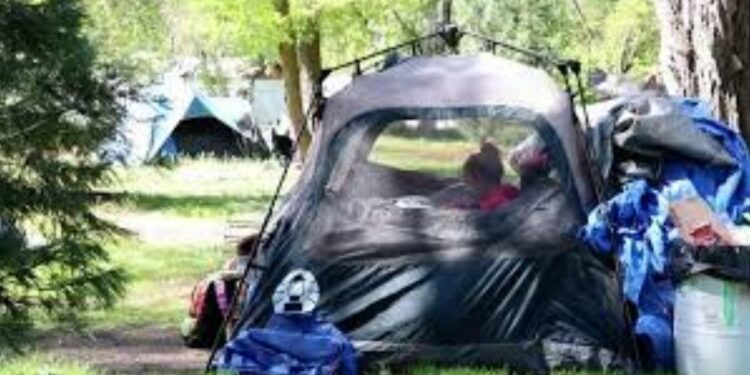It’s difficult to truly understand the impact of a sprawling homeless encampment until you’ve witnessed one firsthand.
Why not allow individuals to choose their own camping locations? What is causing frustration and fear among others due to the presence of impromptu encampments?
Over the past ten years, I have personally witnessed the transformation of once beautiful downtowns and parks into public camping areas in liberal cities. In their pursuit of kindness and compassion, city leaders inadvertently allowed this phenomenon to take hold.
Being born and raised in Oregon, I frequently find myself returning to my home state. I have a deep affection for it, as there is something truly extraordinary about the exquisite natural beauty that Oregon possesses.
It is truly disheartening to witness the surge in homelessness and the negative impact that encampments have had on various neighborhoods, parks, and downtown areas in cities like Portland and Salem.
The campsites are far from tidy. They are often scattered with massive mounds of garbage, posing risks to both health and fire safety. It seems that no attempt is being made to maintain cleanliness in these areas, and there is a complete lack of consideration for others who might want to utilize these public spaces.
Substance use is also widespread among this population, and Oregon’s recent unsuccessful attempt to decriminalize hard drugs only exacerbated the issue.
The presence of these camps, along with the lack of action from city officials, is causing businesses and residents to flee from the cities they once cherished.
I was delighted to learn that a case from Grants Pass, Oregon, has reached the U.S. Supreme Court. The court heard arguments on Monday, and depending on its ruling, cities may once again have the power to address this harmful issue on their own terms.
A widespread problem on liberal West Coast
More than 256,000 people in the United States are homeless and unsheltered; they live on the streets, in parks, or in cars parked on municipal streets.
About half of them live in California, so this isn’t simply an Oregon issue. Cities on the West Coast, including Seattle, San Francisco, Los Angeles, and San Diego, have among the highest rates of homelessness.
However, the chilly and snowy northeastern state of Vermont, home to socialist Sen. Bernie Sanders, has the second-highest percentage of homelessness in the country. In contrast, sunny and pleasant Florida has a homeless rate that is more than two-thirds lower than in California, Oregon, and Vermont.
That is not a coincidence. Liberals control cities and states with substantial homeless populations, allowing the situation to deteriorate.
Grants Pass, a fairly tiny town with a population of 40,000, had attempted to address its own homelessness problem, including a ban on public camping. However, Grants Pass, like other communities, continued to face legal barriers that prevented it from enforcing local laws.
Lower courts, including the 9th U.S. Circuit Court of Appeals, ruled that fining or imprisoning someone for sleeping on public land when there is no sufficient shelter available violated the Eighth Amendment. That’s a difficult thing to define.
Some homeless people refuse to live in shelters and prefer to stay outside.
The liberals on the court appeared to support campaigners for the unhoused. Justice Elena Kagan stated, “Sleeping is a biological necessity.” It’s kind of like breathing. But you wouldn’t think it’s acceptable to criminalize breathing in public.”
Kagan obviously does not grasp the realities of homeless camps. It’s more than just sleeping; in many situations, people live there all day and night. That makes a significant difference in public safety and sanitation.
While the court appeared to be split ideologically, the case has brought together bipartisan support for implementing homelessness rules. Interestingly, California Governor Gavin Newsom filed an amicus brief in support of Grants Pass, claiming that his state’s hands are tied against rational laws. Twenty conservative-led states, including Idaho and Montana, signed on to the brief, and many more expressed their support as well.
According to Newsom’s brief, “While states, cities, and counties work on long-term approaches to help with these crises, they also need the flexibility to address immediate threats to health and safety in public places, both to individuals living in unsafe encampments and to other members of the public impacted by them.”
Supreme Court’s conservative majority seems to side with Grants Pass
What else can cities like Grants Pass do to ensure that these venues are safe for everyone?
Based on the oral arguments, the conservative majority on the court appears sympathetic to Grants Pass. They attempted to distinguish between someone’s status (which is not punishable) and their behavior (which is). Justice Neil Gorsuch posed the question of whether the Eighth Amendment protects public urination or defecation in the absence of public restrooms.
Surely, no city should have to condone that.
All of these concerns highlight how difficult it is for communities to address homelessness. Nonetheless, they are in a better position to do so than judges who are not as familiar with the circumstances.
“There was no appetite to insert judges as’superintendents’ of municipal homeless policies,” Ilya Shapiro, head of constitutional studies and senior scholar at the Manhattan Institute, told X. That’s a positive development, as it implies the reversal of the 9th Circuit’s expansive and innovative 8th Amendment ruling.
In other words, Grants Pass might return to addressing the matter as it deems fit.
We allow states and localities to create rules that govern all aspects of human activity in order to keep our society working properly for everyone.
Managing homelessness should not be any different.










